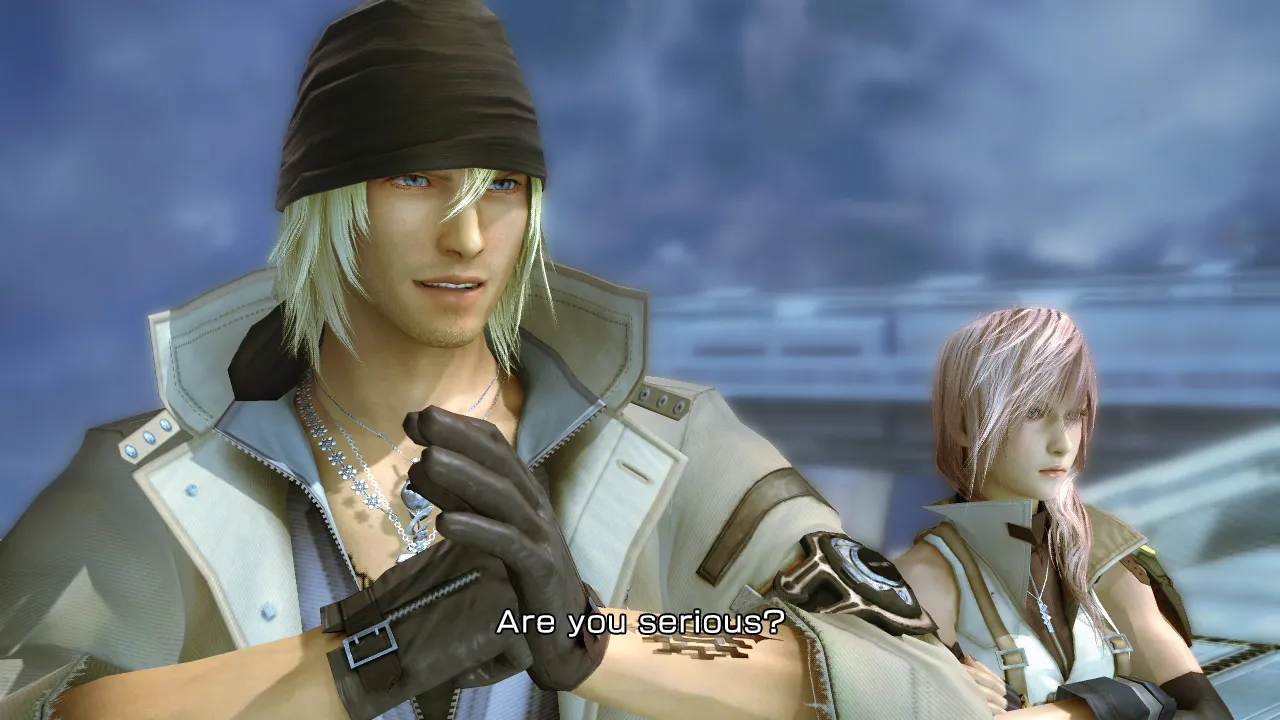Imagine taking part in a D&D campaign where the Dungeon Master has planned nothing. You can usually tell ten minutes in whether you’re going to get something inspired or—far more likely—a jumble of half-baked ideas and abandoned plot threads. Final Fantasy XIII is feels like the latter but worse, because every eye-rolling moment and head-scratching plot turn was planned out, put to paper, and painstakingly brought to life by a team of world-class artists and designers. The sheer wastefulness is appalling.
There’s a scene where a minor character reveals their treachery to our brave heroes. The meeting plays out like this:
[The party encounters a mysterious figure standing alone on a platform.]
Blond Hero: Hey, this suspicious individual is actually on our side!
Guy On Our Side: Fools! I was actually a bad guy the whole time!
[Party Members are shocked and disappointed. One is so livid that they attack the mysterious figure.]
[Guy Not On Our Side calmly repels the attack then starts monologuing about the world’s cosmology.]
I paused the game here. My brow furrowed. Had I missed something? In 20-odd hours of playing, I’d never skipped a cutscene or fast forwarded through dialog. I’d gone out of my way to approach every NPC in case they had something interesting to share about the game’s world (they almost never do). So, why didn’t I know who this was?
This isn’t the first time an important plot event is played for emotional shock value but left me scratching my head instead. Just hours earlier, a character only seen in the background of a few cutscenes emerges as a major villain. He’d barely spoken a word before the reveal. And in his first direct interaction with the main cast, not only do we learn that he is evil, he also announces that he’s literally a god. I rolled my eyes so hard they almost fell out of their sockets.
We can tell what effect these scenes were intended to have by looking at the protagonists’ reactions: Lightning’s cool facade is replaced with rage, Vanille is fighting back tears, and Sazh is louder than usual. These are important moments for our heroes—they’ve learned things that fundamentally change how they understand their place in the workings of this fantasy world. Yet I felt none of that because those these deceivers, heinous though may be, are basically nobodies to me. The game has barely even told me their names; there can be no emotional payoff if you haven’t invited me to pay in.
And so we arrive at the crux of my gripe with Final Fantasy XIII: it absolutely refuses to let me build a relationship with its characters. This is a persistent issue throughout the entire game. The opening scene introduces the mother of one of the main cast, then, not ten minutes later, kills her off with unearned dram (no amount of slow motion or overwrought reaction shots will make me care). We later meet her husband, and hey, he’s actually kind of likable! Shortly after, narrative circumstances push him off stage and out of sight, never to be seen again. Even the main cast isn’t immune to abandonment: Lightning becomes gradually less important to the plot as it develops and Sazh’s crystallized son matters more to the game’s narrative than he does.
I did eventually remember who that fellow on the platform was about halfway into his monologue. In a previous encounter, he’d come swooping in aboard his airship to rescue our heroes, an unexpected savior at an opportune time. Aboard the craft, we’re casually reminded that he is a member of Sanctum, which, for those who don’t know, is the big bad organization that’s actively hunting and trying to kill our heroes. But he’s totally different and not a bad guy because doesn’t like the Sanctum government, despite continuing to captain a Sanctum airship and command a crew decked out entirely in Sanctum gear.
This game is so dumb.

